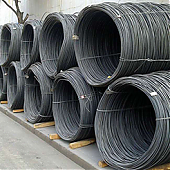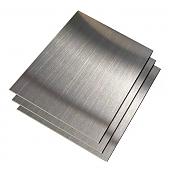0.4mm thick 321 stainless steel strip
Type 321 is a titanium stabilized chromium nickel austenitic stainless steel with corrosion resistance similar to 304/304L. This grade is typically used in the 800-1500?F temperature range where it is stabilized against chromium carbide precipitation by the addition of titanium, which results in the precipitation of titanium carbides. Type 321 has excellent intergranular corrosion resistance after exposure to this temperature range, and this grade resists oxidation up to 1500?F and has higher creep and stress rupture properties than 304/304L. It also possesses good low temperature toughness and is non-magnetic in the annealed condition.
Chemical Composition:
Chemical Composition (wt%) limits as specified in ASTM A240 and ASME SA240
Carbon:0.08
Chromium:17.0-19.0
Nickel:9.0-12.0
Manganese:2.00
Silicon:0.75
Nitrogen:0.10
Phosphorus:0.045
Sulfur:0.030
Titanium:5(C+N) min / 0.70 max
Mechanical Properties:
Mechanical property requirements for annealed product as specified in ASTM A240 and ASME SA240.
Yield Strength, min. (ksi):30
Tensile Strength, min. (ksi):75
Elongation, min. (%):40
Hardness, max. (Rb):95
APPLICATIONS:
Aircraft collector rings, exhaust stacks, carburetor air intensifier tubes, exhaust manifolds, flexible couplings, jet engine parts, mufflers, pressure vessels, tubing, fasteners, flexible metal hose and bellows
COLD FORMING:
Type 321 can be readily formed and drawn. Like most other austenitic stainless steels, type 321 work hardens and may require annealing after severe forming.
HEAT TREATMENT:
Type 321 is non hardenable by heat treatment and can only be hardened by cold working.
The annealing temperature range for Type 321 is 1800 to 2000° F (928 to 1093° C). While the primary purpose of annealing is to obtain softness and high ductility, this steel may also be stress relief annealed within the carbide precipitation range 800 to 1500° F (427 to 816° C), without any danger of subsequent intergranular corrosion. Relieving strains be annealing for only a few hours in the 800 to 1500°F (427 to 816° C) range will not cause any noticeable lowering in the general corrosion resistance, although prolonged heating within this range does tend to lower the general corrosion resistance to some extent. As emphasized, however, annealing in the 800 to 1500° F (427 to 816° C) temperature range does not result in a susceptibility to intergranular attack.
Contact information:
Web:www.jawaysteel.com
Tel No: 0086-21-36360955 /36360933/36361733/36361755
Fax No: 0086-21-36361766
Mob: 0086 13816774351
E-mail:806@jawaysteel.com
Skype:jawaysteel806
Wechat:0086 13816774351
Address: Suite 15G,Yongrong Enterprise Center,No.1111 Liyang Road,HongKou Area,Shanghai 200081,China
Related Products

Factory Introduction
Choose the right stainless steel material according to your needs
316N Stainless Steel